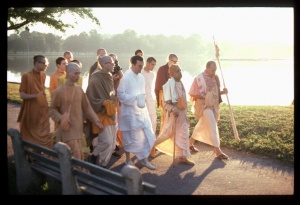CC Madhya 18.197 (1975): Difference between revisions
(Vanibot #0027: CCMirror - Mirror CC's 1996 edition to form a basis for 1975) |
(Vanibot #0020: VersionCompareLinker - added a link to the Version Compare feature) |
||
| Line 2: | Line 2: | ||
<div style="float:left">'''[[Sri Caitanya-caritamrta (1975)|Śrī Caitanya-caritāmṛta (1975)]] - [[CC Madhya (1975)|Madhya-līlā]] - [[CC Madhya 18 (1975)|Chapter 18: Lord Śrī Caitanya Mahāprabhu's Visit to Śrī Vṛndāvana]]'''</div> | <div style="float:left">'''[[Sri Caitanya-caritamrta (1975)|Śrī Caitanya-caritāmṛta (1975)]] - [[CC Madhya (1975)|Madhya-līlā]] - [[CC Madhya 18 (1975)|Chapter 18: Lord Śrī Caitanya Mahāprabhu's Visit to Śrī Vṛndāvana]]'''</div> | ||
<div style="float:right">[[File:Go-previous.png|link=CC Madhya 18.196 (1975)|Madhya-līlā 18.196]] '''[[CC Madhya 18.196 (1975)|Madhya-līlā 18.196]] - [[CC Madhya 18.198 (1975)|Madhya-līlā 18.198]]''' [[File:Go-next.png|link=CC Madhya 18.198 (1975)|Madhya-līlā 18.198]]</div> | <div style="float:right">[[File:Go-previous.png|link=CC Madhya 18.196 (1975)|Madhya-līlā 18.196]] '''[[CC Madhya 18.196 (1975)|Madhya-līlā 18.196]] - [[CC Madhya 18.198 (1975)|Madhya-līlā 18.198]]''' [[File:Go-next.png|link=CC Madhya 18.198 (1975)|Madhya-līlā 18.198]]</div> | ||
{{CompareVersions|CC|Madhya 18.197|CC 1975|CC 1996}} | |||
{{RandomImage}} | {{RandomImage}} | ||
==== TEXT 197 ==== | ==== TEXT 197 ==== | ||
| Line 11: | Line 10: | ||
<div class="verse"> | <div class="verse"> | ||
:tomāra paṇḍita-sabāra nāhi śāstra-jñāna | :tomāra paṇḍita-sabāra nāhi śāstra-jñāna | ||
:pūrvāpara-vidhi-madhye | :pūrvāpara-vidhi-madhye 'para'--balavān | ||
</div> | </div> | ||
| Line 18: | Line 17: | ||
<div class="synonyms"> | <div class="synonyms"> | ||
tomāra paṇḍita-sabāra—of the learned scholars of your community; nāhi—there is not; śāstra-jñāna—knowledge of revealed scripture; pūrva- | tomāra paṇḍita-sabāra—of the learned scholars of your community; nāhi—there is not; śāstra-jñāna—knowledge of revealed scripture; pūrva-āpara—former and latter; vidhi—regulative principles; madhye—among; para—the conclusion at the end; balavān—most powerful. | ||
</div> | </div> | ||
| Line 25: | Line 24: | ||
<div class="translation"> | <div class="translation"> | ||
"The scholars of the Koran are not very advanced in knowledge. Although there are many methods prescribed, they do not know that the ultimate conclusion should be considered the most powerful. | |||
</div> | </div> | ||
Latest revision as of 11:17, 27 January 2020
Śrī Caitanya-caritāmṛta (1975) - Madhya-līlā - Chapter 18: Lord Śrī Caitanya Mahāprabhu's Visit to Śrī Vṛndāvana

His Divine Grace
A.C. Bhaktivedanta Swami Prabhupada
A.C. Bhaktivedanta Swami Prabhupada
TEXT 197
- tomāra paṇḍita-sabāra nāhi śāstra-jñāna
- pūrvāpara-vidhi-madhye 'para'--balavān
SYNONYMS
tomāra paṇḍita-sabāra—of the learned scholars of your community; nāhi—there is not; śāstra-jñāna—knowledge of revealed scripture; pūrva-āpara—former and latter; vidhi—regulative principles; madhye—among; para—the conclusion at the end; balavān—most powerful.
TRANSLATION
"The scholars of the Koran are not very advanced in knowledge. Although there are many methods prescribed, they do not know that the ultimate conclusion should be considered the most powerful.